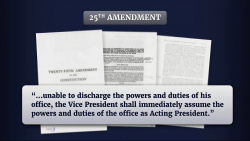President Erdogan is inching closer to overturning Turkey’s secular constitution.
When the great church of Holy Wisdom, Hagia Sophia, was completed in Constantinople in AD 537, Emperor Justinian exclaimed, “Oh, Solomon, I have vanquished thee!” a reference to King Solomon’s Temple in Jerusalem. This is likely the same feeling that Turkey’s President Recep Tayyip Erdoğan will experience when a new Turkish constitution replaces the 1982 constitution, which reflects the secular values of modern Turkey’s founder, Mustafa Kemal Atatürk.
Erdogan calls the 1982 constitution “the military constitution,” since it was drafted in the aftermath of the military coup in 1980. Now, he has appointed a commission of ten lawyers to draft a new constitution, which he claims will be “civil and liberal.”
The preamble of the 1982 constitution states that “sacred religious feelings shall absolutely not be involved in state affairs and politics as required by the principle of secularism.” Article 24 stipulates that “No one shall be allowed to exploit or abuse religion or religious feelings, or things held sacred by religion, in any manner whatsoever, for the purpose of personal or political interest or influence, or for even partially basing the fundamental, social, economic, political, and legal order of the State on religious tenets.” But this is precisely what Erdogan has done.
The debate about Turkey’s secular constitution dates back to 1994 when Erdogan was elected mayor of Istanbul for Necmettin Erbakan’s Welfare Party (RP), which advocated for political Islam. Eight months after being elected, Erdogan took part in a TV debate when an intellectual, Aziz Nesin, criticized Erdogan for stating, “I am a follower of Sharia (Islamic law).” Erdogan retorted, “Nesin has the freedom and the right to say ‘I am irreligious.’ Why can’t I have the right to say I am a Muslim and a follower of Sharia?”
Nesin argued that it contradicted the Turkish Constitution, which states that the Turkish state is a secular one. Either you change the constitution and introduce Sharia, or you follow the constitution. You can’t be both a follower of Sharia and a secular.
The Welfare Party became Turkey’s largest political party, and with its “National Vision,” set out to establish “a just order” (Sharia), but in 1998 was dissolved by the Constitutional Court for being a “centre of activities contrary to the principles of secularism.”
The same year, Erdogan was sent to prison for four months for quoting a nationalist poem from 1912, but he had already made clear, “Democracy is not our aim. It is the vehicle.” However, he had learned his lesson, and when the AKP (Justice and Development Party) was founded in 2001 and came to power a year later, it presented itself as a Western, reformist, moderate, and neoliberal party.
Europe and the United States bought the narrative, and as the US secretary of state Condoleeza Rice gushed, the AKP was “a government dedicated to pulling Turkey west toward Europe.” President Obama spoke of “a model partnership” with Turkey, and Erdogan used the same phrase after Donald Trump’s reelection.
In 1999, the EU declared Turkey a candidate country, and the AKP made strategic use of EU conditions to further its aims. Once it had emasculated the military and secular establishment in a series of show trials from 2008 to 2013, it abandoned the EU process.
Necmettin Erbakan’s son, Fatih, has founded a new Welfare Party (YRP), which won five seats in the 2023 parliamentary elections. Initially, it supported the AKP, but in an interview last September, Fatih Erbakan condemned the AKP as “a superficial version of Islam” and for an economic policy based on the unjust distribution of wealth.
Although it began as a grassroots movement, almost 70 percent of the Turks polled consider the AKP favors the rich, while only 16 percent believe it is on the side of the poor. Erdogan and his wife Emine have been roundly criticized for their lavish lifestyle.
In the new Syria, where Turkey plays a leading role, its temporary constitution is marked by a key change from the previous constitution, as Islamic jurisprudence is no longer “a principal source of legislation” but “the principal source.” Minority rights are also ignored.
Turkey is often described as the West’s “bridgehead” to the Middle East, but the converse can be true. Given the mass migration to Europe from MENAPT countries (Middle East, North Africa, Pakistan, and Turkey), the clash of values has often proved to be a source of conflict.
For example, the Islamic definition of freedom of expression, as defined by the Cairo Declaration of Human Rights in Islam (1990), constrains the expression of opinion to all that is not contrary to Sharia law.
This criterion contravenes the UN Declaration of Human Rights and the International Covenant on Civil and Political Rights. Yet, Turkey signed both the Cairo Declaration and the International Covenant. Furthermore, as a member of the Council of Europe, it is also a party to the European Convention on Human Rights.
In Erdogan’s Turkey, Islamic values have come to predominate inside education, the economy, and foreign policy, which has not only led to an alienation from the Western world but also internal conflict. The Gezi Park protests in 2013, led by educated young people, were the first uprising against Erdogan’s dogmatic policies and the demonstrations against the arrest of Istanbul’s popular mayor, Ekrem Imamoglu, the second.
Erdogan’s move to constitutional change began when his political ally, Devlet Bahceli, shook the hand of a leader of the pro-Kurdish DEM (Peoples’ Equality and Democracy Party) in the Turkish parliament in October last year. This was augmented by the decision of the PKK (Kurdistan Workers’ Party) to disband and disarm and end its 40 years of conflict with Turkey. But the process has raised more questions than answers.
Erdogan claims that “a terror-free Türkiye” will take the Turkish economy to new heights, but there are misgivings. The AKP and its allies can rely on only 321 seats in parliament and will need 360 (out of 600) to bring a new constitution to a referendum. With the support of the DEM’s 56 seats, they will come closer to their goal.
Whatever the outcome, one fact remains. Turkey’s leader, Recep Tayyip Erdogan, now an ailing septuagenarian, has no intention of relinquishing power.
About the Author: Robert Ellis
Robert Ellis is a Turkey analyst, commentator, and international advisor at the Research Institute for European and American Studies in Athens.
Image: Siarhei Liudkevich / Shutterstock.com.
















